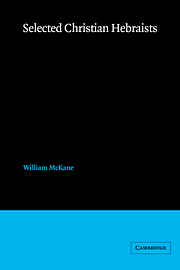Book contents
- Frontmatter
- Contents
- Preface
- List of abbreviations
- Introduction
- 1 The foundations
- 2 Andrew of St Victor
- 3 William Fulke and Gregory Martin
- 4 Richard Simon
- 5 Alexander Geddes
- Conclusion
- APPENDICES
- Notes
- Select bibliography
- General index
- Index of modern authors
- Scripture references
- Index of early Christian Literature
- Frontmatter
- Contents
- Preface
- List of abbreviations
- Introduction
- 1 The foundations
- 2 Andrew of St Victor
- 3 William Fulke and Gregory Martin
- 4 Richard Simon
- 5 Alexander Geddes
- Conclusion
- APPENDICES
- Notes
- Select bibliography
- General index
- Index of modern authors
- Scripture references
- Index of early Christian Literature
Summary
The Church's first Greek Bible
There is some value in being strict about terminology in so far as narrow inexactness may give rise to a wider confusion. The term ‘Septuagint’ refers to a particular Greek translation of the first five books of the Hebrew Bible, the Pentateuch or Torah. According to the Letter of Aristeas this enterprise was undertaken at Alexandria in the third century B.C. by a Ptolemaic king, Philadelphos, in order that the Jewish law might be represented in his royal library. To this end, so the account runs, he secured seventy-two translators from Palestine, six from each of the twelve tribes of Israel, and the work was done on the island of Pharos which was connected to Alexandria by a causeway.
The elaboration of this narrative by the Alexandrian Jew, Philo, who died in A.D. 40, introduced miraculous elements: all the translators worked independently, but arrived at an identical result. Hence they were inspired and the translation which they produced was free from all error. When Christian scholars appropriated this elaborated account of the origin of the Septuagint, they applied it not to the Torah but to the entire Greek Bible which had been embraced by the Christian Church, and this is what the Septuagint has come to mean in Christian use. As such, it contains all the books which comprise the Hebrew Bible, as well as those which are commonly called the Apocrypha.
- Type
- Chapter
- Information
- Selected Christian Hebraists , pp. 11 - 41Publisher: Cambridge University PressPrint publication year: 1989

